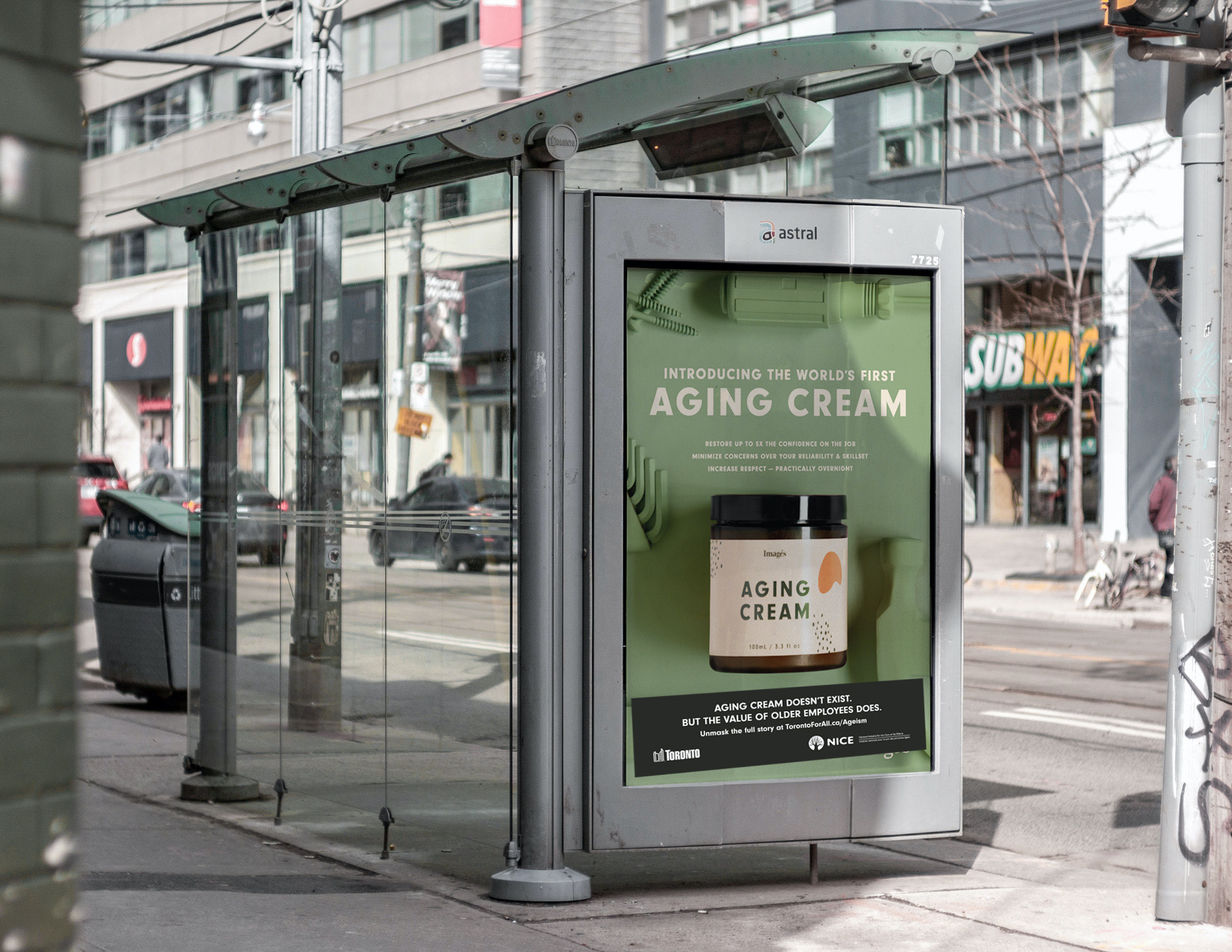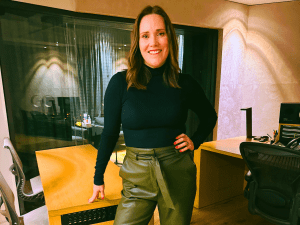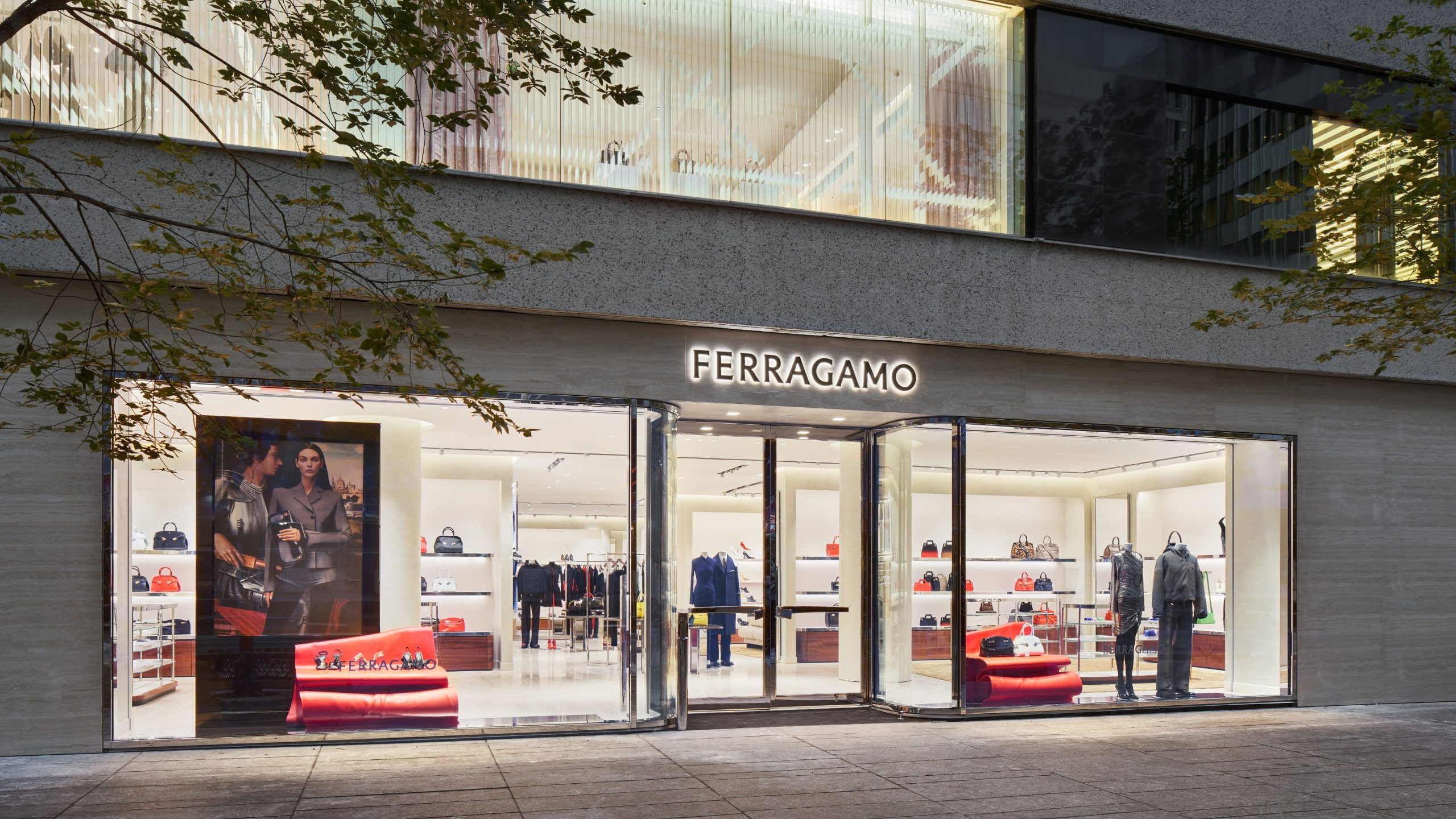[vc_row][vc_column][vc_column_text]
The campaign hopes Torontonians will realize that no one is exempt from ageing.
If you look for birthday cards for someone turning, say, 50 on Etsy, you’ll find an abundance of Comic Sans-like typeface inked onto milky cardstock, saying something like, “Bad news: you’re 50! Good news: I’m not!!” Or, a speech bubble emanating from someone out of frame asking Google’s Alexa for their age, and Alexa responding with, “You old.”
Laura Tamblyn Watts, director of policy and founding member of the National Initiative for the Care of the Elderly (NICE), says that jokes such as these that appear on something as easily-accessible as birthday cards perpetuate ageism. According to NICE, ageism is an act of stereotyping; it’s the discrimination against people or groups of people because of their age, whether because they are young or because they are older. Meanwhile, according to a labour force report from 2018, Canadians over the age of 55 make up about 37.9 per cent of the working population. In light of this, NICE wants to see us celebrating age in the workplace.
In response to this often overlooked yet prevalent kind of discrimination, NICE has partnered with the City of Toronto to launch the Toronto For All campaign, aimed at combating ageism in the workplace. Toronto-based marketing agency Public Inc. has worked on the campaign for the city. According to Ashley Kenley, a strategic communications representative at Public, the agency’s work is informed by the belief that companies can make tremendous social change; that community impact and the generation of business profit are not mutually exclusive. This philosophy is something called community social responsibility, Kenley says, and it’s a model of action that should inspire workplaces to take a stance against harmful biases that lead to material setbacks for workers and businesses alike.
An advisory committee was created by NICE comprised of people who’ve experienced ageism and who work with older adults. This committee worked with Public and representatives from Toronto to develop the campaign.
The campaign itself is remarkable on a few fronts. Wrapped around bus shelters throughout Toronto, you will see an ad for an ageing cream created by a brand called Imagés. The cream is meant to make you look older. In a video for the campaign, people, when asked to try the cream, said they didn’t want to look older, they would not even attempt to sample it. But when it was revealed to them that Imagés is an anagram for “ageism” and that the reasons they presented for not trying the cream were part and parcel of the ideas surrounding ageism — that being older is bad — the people were obviously moved. A cream to make you look older doesn’t exist, but ageism does, the campaign proclaims.[/vc_column_text][vc_row_inner][vc_column_inner width=”1/2″][vc_gallery interval=”3″ images=”15432″ img_size=”medium”][/vc_column_inner][vc_column_inner width=”1/2″][vc_column_text]The reason why this campaign is effective is that it gets us to interrogate our beliefs, which is the first step in making meaningful change. When we start thinking critically about our attitudes, we start a ripple effect of introspective behaviour in those around us.
Ageism is grounded in the notion that drives other kinds of discrimination, namely, the idea that all people of a certain group are alike. Watts says that ageism, just like racism, dehumanizes groups and has detrimental real-life consequences. Older adults can be denied opportunities in the workplace, and even certain rights.[/vc_column_text][/vc_column_inner][/vc_row_inner][/vc_column][/vc_row][vc_row][vc_column][vc_column_text]Ageism can be contained in the words we speak in the workplace, the seemingly inconsequential jokes that show others that it’s okay to say something like “Bad news: you’re 50!” It can also be contained in behaviours — Watts says that not making buildings accessible contributes to ageism, in addition to excluding all others with accessibility needs. Then there’s institutional discrimination, which can be contained in municipal, provincial, or federal policies.
Of course, the cards on Etsy are, presumably, not wanting to discriminate, but biases are often not enacted or held intentionally or even knowingly. Most biases against people are inculcated through surroundings from a young age, an unconscious informed by the dominant order that harbours these biases. These influences can be silently insidious or of a militant agenda. This is why we need to be mindful of the words we speak, Watts says.
Watts explains, what makes ageism one of the more harmful kinds of biases is that it’s so widely accepted — it’s normalized, she says. The fact that the birthday cards exist and are not inciting outrage is the problem. And we should care — as we should about all other kinds of biases. Watts says, for starters, we all are intimately impacted by ageism. We all will get old, hopefully.
All forms of discrimination weigh differently on each person, because they filter through different identities. Women, women of colour, and those of the LGBTQ+ community are doubly impacted by ageism, just because of our existence at the intersect of so many other marginalized identities, each of which might carry with it a different bias. Notwithstanding, something that this campaign illuminates is that age does not discriminate — the ageing cream could feasibly be marketed to any and every person. It doesn’t matter who we are, every year, we get older, and there is nothing inherently wrong in this.
This is why the need to change behaviours in the workplace to end age-based discrimination is so urgent. And the only way to substantially make a difference in the lives of our older colleagues is through being self-conscious, Watts says. Through interrogating our beliefs, and being mindful of what we say and when we say it, being vocal when others misspeak or perpetuate the stereotypes, we can create measurable changes in our workplaces, and promote healthier, more accepting futures.[/vc_column_text][/vc_column][/vc_row]













